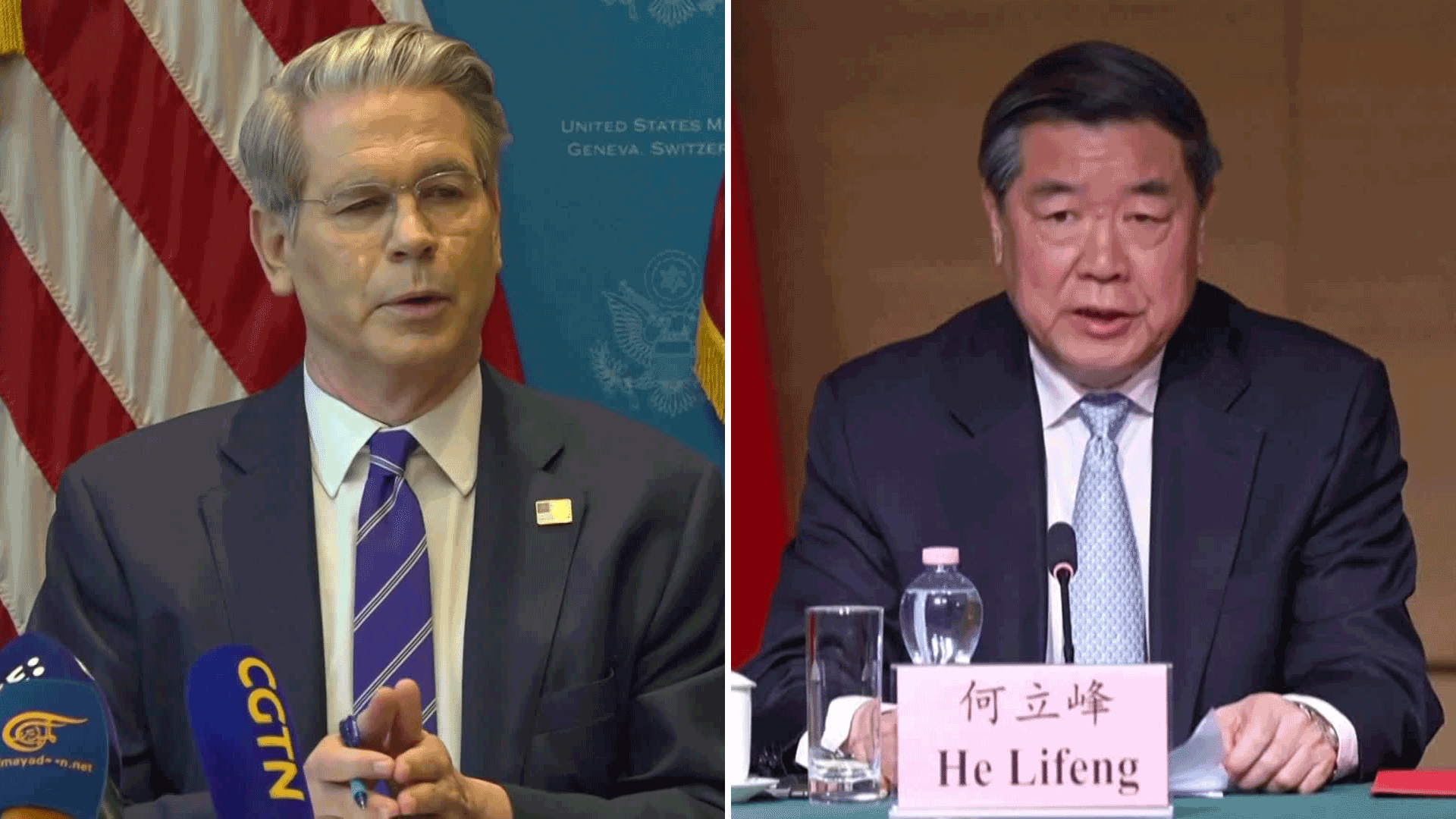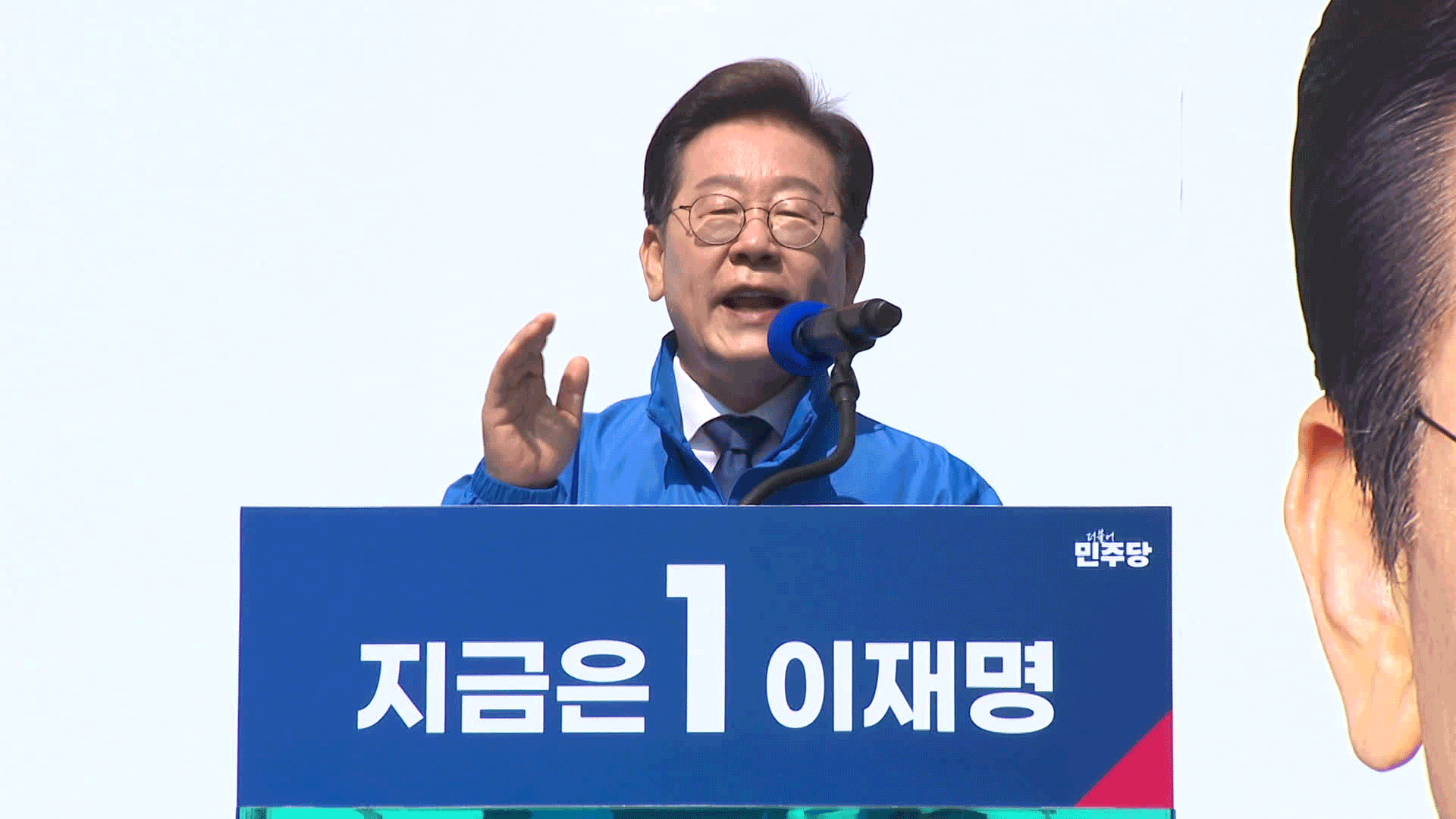[Anchor]
The United States and China have decided to significantly reduce the high tariffs they imposed on each other in retaliation.
For now, Chinese products will be subject to a 30% tariff in the U.S., while U.S. products will face a 10% tariff in China for 90 days, and additional negotiations will continue.
Reporter Park Seok-ho has the details.
[Report]
During high-level negotiations held over the weekend in Geneva, Switzerland, the U.S. and China agreed to equally reduce the tariffs they impose on each other by 115 percentage points.
The tariff on Chinese products exported to the U.S. will be lowered to 30%, while only a 10% tariff will be applied to U.S. products in China.
This reduction is more drastic than expected.
The reduced tariffs will take effect this Wednesday and will be in place for 90 days.
The joint statement also specified that China will take measures to suspend 'non-tariff measures'.
It is interpreted that the agreement reflects the U.S. intention to address issues such as China's export controls on rare earth elements.
[Scott Bessent/U.S. Secretary of the Treasury: "We do want trade. We want more balanced trade, and I think that both sides are committed to achieving that."]
China's Ministry of Commerce also welcomed the move, stating that it aligns with the expectations of producers and consumers in both countries, as well as the interests of both nations and the world.
[He Lifeng/Chinese Vice Premier/Before the agreement announcement: "The atmosphere of the talks was candid, deep, and constructive. The discussions made substantial progress and reached important agreements."]
However, given that this agreement is a temporary measure for 90 days, it is difficult to be optimistic about how future negotiations will conclude.
The issues that remain as justifications for tariffs, such as the fentanyl problem and the U.S. trade deficit with China, still pose a risk of escalating the trade war.
The impact of the U.S.-China agreement on negotiations with other countries, including South Korea, is also being closely watched.
This is KBS News, Park Seok-ho.
The United States and China have decided to significantly reduce the high tariffs they imposed on each other in retaliation.
For now, Chinese products will be subject to a 30% tariff in the U.S., while U.S. products will face a 10% tariff in China for 90 days, and additional negotiations will continue.
Reporter Park Seok-ho has the details.
[Report]
During high-level negotiations held over the weekend in Geneva, Switzerland, the U.S. and China agreed to equally reduce the tariffs they impose on each other by 115 percentage points.
The tariff on Chinese products exported to the U.S. will be lowered to 30%, while only a 10% tariff will be applied to U.S. products in China.
This reduction is more drastic than expected.
The reduced tariffs will take effect this Wednesday and will be in place for 90 days.
The joint statement also specified that China will take measures to suspend 'non-tariff measures'.
It is interpreted that the agreement reflects the U.S. intention to address issues such as China's export controls on rare earth elements.
[Scott Bessent/U.S. Secretary of the Treasury: "We do want trade. We want more balanced trade, and I think that both sides are committed to achieving that."]
China's Ministry of Commerce also welcomed the move, stating that it aligns with the expectations of producers and consumers in both countries, as well as the interests of both nations and the world.
[He Lifeng/Chinese Vice Premier/Before the agreement announcement: "The atmosphere of the talks was candid, deep, and constructive. The discussions made substantial progress and reached important agreements."]
However, given that this agreement is a temporary measure for 90 days, it is difficult to be optimistic about how future negotiations will conclude.
The issues that remain as justifications for tariffs, such as the fentanyl problem and the U.S. trade deficit with China, still pose a risk of escalating the trade war.
The impact of the U.S.-China agreement on negotiations with other countries, including South Korea, is also being closely watched.
This is KBS News, Park Seok-ho.
■ 제보하기
▷ 카카오톡 : 'KBS제보' 검색, 채널 추가
▷ 전화 : 02-781-1234, 4444
▷ 이메일 : kbs1234@kbs.co.kr
▷ 유튜브, 네이버, 카카오에서도 KBS뉴스를 구독해주세요!
- U.S. and China reduce tariffs
-
- 입력 2025-05-13 01:24:58

[Anchor]
The United States and China have decided to significantly reduce the high tariffs they imposed on each other in retaliation.
For now, Chinese products will be subject to a 30% tariff in the U.S., while U.S. products will face a 10% tariff in China for 90 days, and additional negotiations will continue.
Reporter Park Seok-ho has the details.
[Report]
During high-level negotiations held over the weekend in Geneva, Switzerland, the U.S. and China agreed to equally reduce the tariffs they impose on each other by 115 percentage points.
The tariff on Chinese products exported to the U.S. will be lowered to 30%, while only a 10% tariff will be applied to U.S. products in China.
This reduction is more drastic than expected.
The reduced tariffs will take effect this Wednesday and will be in place for 90 days.
The joint statement also specified that China will take measures to suspend 'non-tariff measures'.
It is interpreted that the agreement reflects the U.S. intention to address issues such as China's export controls on rare earth elements.
[Scott Bessent/U.S. Secretary of the Treasury: "We do want trade. We want more balanced trade, and I think that both sides are committed to achieving that."]
China's Ministry of Commerce also welcomed the move, stating that it aligns with the expectations of producers and consumers in both countries, as well as the interests of both nations and the world.
[He Lifeng/Chinese Vice Premier/Before the agreement announcement: "The atmosphere of the talks was candid, deep, and constructive. The discussions made substantial progress and reached important agreements."]
However, given that this agreement is a temporary measure for 90 days, it is difficult to be optimistic about how future negotiations will conclude.
The issues that remain as justifications for tariffs, such as the fentanyl problem and the U.S. trade deficit with China, still pose a risk of escalating the trade war.
The impact of the U.S.-China agreement on negotiations with other countries, including South Korea, is also being closely watched.
This is KBS News, Park Seok-ho.
The United States and China have decided to significantly reduce the high tariffs they imposed on each other in retaliation.
For now, Chinese products will be subject to a 30% tariff in the U.S., while U.S. products will face a 10% tariff in China for 90 days, and additional negotiations will continue.
Reporter Park Seok-ho has the details.
[Report]
During high-level negotiations held over the weekend in Geneva, Switzerland, the U.S. and China agreed to equally reduce the tariffs they impose on each other by 115 percentage points.
The tariff on Chinese products exported to the U.S. will be lowered to 30%, while only a 10% tariff will be applied to U.S. products in China.
This reduction is more drastic than expected.
The reduced tariffs will take effect this Wednesday and will be in place for 90 days.
The joint statement also specified that China will take measures to suspend 'non-tariff measures'.
It is interpreted that the agreement reflects the U.S. intention to address issues such as China's export controls on rare earth elements.
[Scott Bessent/U.S. Secretary of the Treasury: "We do want trade. We want more balanced trade, and I think that both sides are committed to achieving that."]
China's Ministry of Commerce also welcomed the move, stating that it aligns with the expectations of producers and consumers in both countries, as well as the interests of both nations and the world.
[He Lifeng/Chinese Vice Premier/Before the agreement announcement: "The atmosphere of the talks was candid, deep, and constructive. The discussions made substantial progress and reached important agreements."]
However, given that this agreement is a temporary measure for 90 days, it is difficult to be optimistic about how future negotiations will conclude.
The issues that remain as justifications for tariffs, such as the fentanyl problem and the U.S. trade deficit with China, still pose a risk of escalating the trade war.
The impact of the U.S.-China agreement on negotiations with other countries, including South Korea, is also being closely watched.
This is KBS News, Park Seok-ho.
이 기사가 좋으셨다면
-
좋아요
0
-
응원해요
0
-
후속 원해요
0
















이 기사에 대한 의견을 남겨주세요.